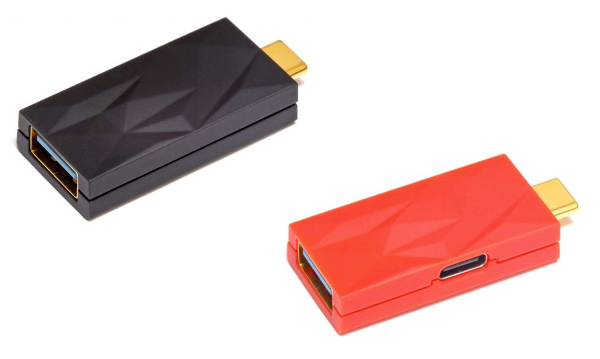iFi Takes the Noise Out of USB Audio

Priced at $49 each, the iSilencer+ and iDefender+ are improved versions of iFi’s popular iSilencer and iDefender — thumb-drive-size devices designed to filter noise out of the audio signal when inserted between a computer’s USB port and an outboard digital-to-analog converter (DAC).
iSilencer+ combines passive filtering with active noise cancellation circuitry to “measurably eradicate” noise that corrupts audio signals as they travel through a USB link. Adapted from military radar technology and similar in principle to circuitry used in active noise cancelling headphones, iFi’s ANC II circuit generates a signal identical to the incoming electrical noise signal but opposite in phase to effectively cancel out low- and mid-frequency noise, while passive insulating filters deal with higher frequency interference.
The transfer mode used for “USB Audio Class” devices is more demanding of USB hardware/software than the bulk/burst mode used for peripherals such as printers and hard drives, the company explained. “Error checking is present but there is no re-transmission in the event of CRC (cyclic redundancy check) errors. Electrical noise on USB signals causes CRC errors and thus data loss, as does poor signal integrity. This can result in audio signal distortion, artifacts (such as clicks and pops) and latency — things that can affect the performance of computer-based audio systems.”
Besides removing noise, the iSilencer+ reduces the occurrence of jitter and “rebalances” the signal to ensure the signal received by the DAC is identical to the original source, regardless of audio format, according to the company. The updated device is said to provide better noise reduction over its predecessor due to the addition of low-ESR (equivalent series resistance) tantalum capacitors for input and output filtering and is available in three versions to accommodate USB-A to USB-A, USB-C to USB-A, and USB-C to USB-C connections. All have gold-plated connectors and support USB 3.0 as well as backward compatibility with USB 2.0.
In addition to using the iSilencer+ for an active USB link between computer and DAC, the device can be plugged into spare USB ports to reduce radiated electomagnetic interference (EMI) and used between external hard drives and music servers. “Each time the number of units — and therefore the number ANC II circuits — is doubled, noise reduction capability also doubles,” the company said.
While the effect of the iSilencer+ on sound quality varies from system to system, iFi says listeners can expect to hear “more clarity, greater dynamic extension and sharper leading edges, making music sound more vivid and open.”
The iDefender+ is a more specialized device designed to detect and eradicate ground loops, which can produce an audible buzz or hum, when plugged into the source device’s USB port. When used with a DAC that relies on USB power from a computer, the iDefender+ also blocks power from the computer, instead feeding the DAC with power from its own external supply, which is said to “significantly improve” performance of the DAC.
Like the iSilencer+, the iDefender+ is available in three versions and also incorporates gold-plated connectors and low-ESR tantalum capacitors.
For more information, visit ifi-audio.com.

























































